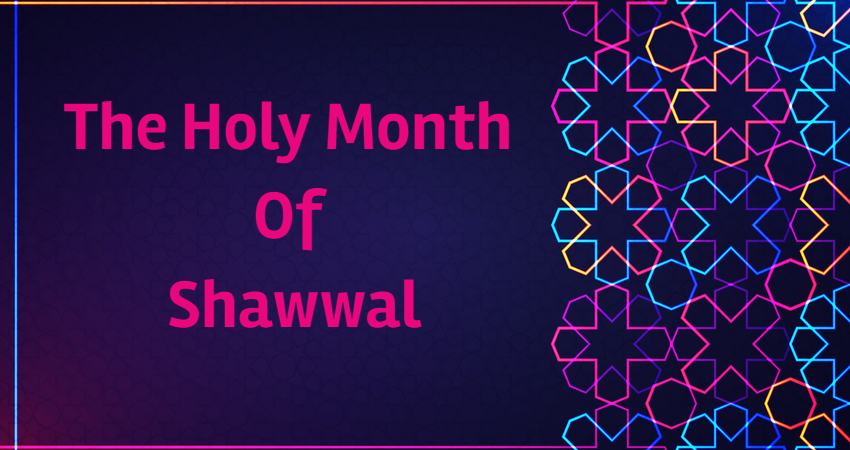Shawwal is the 10th month in the Islamic calendar following the holy month of Ramadan. It is loved worldwide because the first day of the month is celebrated as Eid al-Fitr. Though the 1st day is celebrated as a feast, Muslims keep a 6 day fast just after Eid al-Fitr. It is believed that fasting 6 days after Eid al-Fitr increases the blessings of Ramadan fasting and makes up for any unintentional deficiency left during Ramadan fasting.
Shawwal Meaning
‘Shawwal’—derived from the Arabic word Sawaal which means ‘raised’—draws its inspiration from the camels who carry their little one during this time. Additionally, it also means breakage/uplift, as, before the establishment of Islam, Arab tribes believed that marriages held in the month of Shawwal would always be unsuccessful.
Importance of Shawwal for Muslims
Fasting in the Ramzan month is one of the pillars of Islam. However, the month of Shawwal is also of special importance to the Muslims. It is during this month that Allah has bestowed the Eid-ul-Fitr celebration. The event is considered to be Allah’s reward for the successful completion of Ramzan.
Fasting for a period of six days in the holy Shawwal month is of immense virtue to the Muslims. It also compensates for any short falling that one might have made during the fasting of Ramzan. With such religious importance of the Shawwal month, performing Umrah in Shawwal is a pious thought.
Shawwal Fasting
Fasting is an indispensable part of Islamic culture. It helps people detach from the world and focus on devoting themselves to Allah. Though fasting in itself is highly rewarding, fasting during Shawwal offers great benefits. It is believed that fasting after Eid ul-Fitr is equal to fasting throughout the year. Shia Muslims fast six days after Eid, while Sunni Muslims conduct three days of fasting post Eid.
According to a hadith in Sahih Muslims, Prophet Muhammad said:
“Whoever fasts in the month of Ramadan and then follows it with six days of fasting in the month of Shawwal, it will be as if he fasted for the entire year.”
Benefits of fasting 6 days of Shawwal:
- Rewards of Shawwal fasting 6 days consecutively equates to rewards of fasting throughout the year.
- It covers up and compensates for the deficiency left in Ramadan fast.
- Fasting after Ramadan acts as a sign that Allah has accepted Ramadan fasts and granted an individual the strength to do good deeds of fasting again in Shawwal.
- Shawwal fasting helps an individual seek further guidance from Allah and lead a pious life after Ramadan away from sins.
Fasting in Shawwal Hadith
As per a Hadith explained by the companion of Prophet Muhammad (PBUH), Abu Ayyub al-Ansari, “Whoever fasts in the month of Ramzan and then follows it with six days of fasting in the month of Shawwal, it will be as if he had fasted throughout the year.”
According to another Hadith, “Performing Umrah during Ramadan is equal to hajj.”
That explains why numerous Muslims tend to opt for Umrah in Shawwal. It is essential to note that there is no difference in the ritual itself, irrespective of the timeline. However, rituals will slightly differ for Umrah Mufradah and Umrah Tamattu.
According to the words of the Prophet Muhammad (PBUH), Umrah is a desirable act or a Sunnah for the Muslims. Although there is no specific time to perform Umrah, there is a difference between performing it in the month of Shawwal and the rest of the year.
Umrah in Shawwal
Shawwal is the blessed month in which Eid ul-Fitr is celebrated. Since it is a holy month, performing Umrah in Shawwal is absolutely in compliance with the Islamic Laws. It is vital to note that there are two distinct types of Umrah. One is Umrah al-Tamattu and the other is Umrah al-Mufradah.
Umrah al-Mufradah can be performed by Muslims anytime during the year. However, it must not be done during the time of Hajj. Umrah al-Tamattu is mainly performed along with Hajj. That is why this Umrah is performed in the months of Hajj. These include Dhu al-Hijjah, Dhu al-Qadah, and Shawwal.
It is important to remember that if one opts for Umrah in Shawwal it is in association with Hajj, thereby translating it to the Hajj of Tamattu. Likewise, Umrah that is successfully completed before Shawwal cannot be accepted as the Umrah of Tamattu.
However, there are several conditions one must fulfill to perform Umrah in Shawwal. The most basic of these is that one must be an adult Muslim, who has the physical and the financial capacity to embark on the journey. Women need to have a Mahram or male relative to fulfill the Umrah.
5 Facts about Shawwal
- The historic battle of Uhud took place in the month of Shawwal.
- The battle of Hunayn was also fought in this month.
- In 1926, the al-Baqi cemetery was demolished by the The Sultanate of Nejd during the month of Shawwal.
- 13th of Shawwal, 194 AH is the birthdate of popular Islamic scholar, Imam al-Bukhari.
- Imam Ja’far al-Sadiq, the founder of the Ja’fari school of jurisprudence was martyred this month.
The month of Shawwal is the time for celebration and to devote oneself to the service of Allah. Make the most of it by fasting for six days and and if possible perform Umrah as well.
Shawwal Month FAQs
What are the advantages of observing fasting in Shawwal?
One of the most crucial advantages of fasting six days of Shawwal is that it compensates for any deficiency in mandatory Ramadan fasts, as no one is without flaws or sins.
What does it mean to fast during Shawaal?
Shawwal is the tenth month in the Islamic calendar, and Eid ul-Fitr marks the beginning of the Holy Month of Shawwal, which is rejoiced by Muslims. After three days of Eid ul-Fitr, a believer must fast for six days of Shawaal to show that they are humble and grateful to Allah SWT for all the bounties received during the festival.
When should I start fasting during Shawwal?
Because fasting on the day of Eid is haram, one might begin fasting from the second day of Shawwal. Alternatively, it can be done in any order during the month of Shawwal, depending on how convenient it is for the individual.
What makes Shawwal unique?
The ceremony is seen as reward from Allah for completing Ramzan successfully. Fasting for six days during the holy month of Shawwal is highly beneficial to Muslims. It also compensates for any shortfalls that may have occurred during Ramzan fasting.
Who is excused from fasting during Shawaal?
Exemptions apply to children under the age of puberty, the elderly, people who are physically or psychologically unable to fast, pregnant women, breastfeeding mothers, and travellers. From sunrise to sundown, fasting means abstaining from all food and drink, including water and chewing gum.
When does Shawwal end in the year 2023?
Shawwal in 2023 will end on 20th May.
Which month comes after Shawwal?
Dhu al-Qadah, the 11th month in Islamic Calendar, succeeds Shawwal.
How many days are there in Shawwal?
There are 29 or 30 days in Shawwal. The days in the month keep changing from 29 to 30 and vice versa in consecutive years.
Is it allowed to have nikah in the month of Shawwal?
In contrast to the Arab beliefs, it is okay to get married in this month. The two months when Muslims avoid wedding are Muharram and Ramadan









